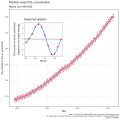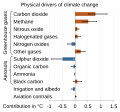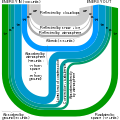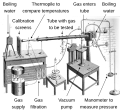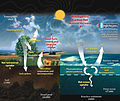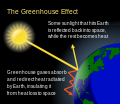Portal:Climate change
The Climate Change Portal Present-day climate change includes both global warming—the ongoing increase in global average temperature—and its wider effects on Earth's climate system. Climate change in a broader sense also includes previous long-term changes to Earth's climate. The current rise in global temperatures is driven by human activities, especially fossil fuel burning since the Industrial Revolution. Fossil fuel use, deforestation, and some agricultural and industrial practices release greenhouse gases. These gases absorb some of the heat that the Earth radiates after it warms from sunlight, warming the lower atmosphere. Carbon dioxide, the primary gas driving global warming, has increased in concentration by about 50% since the pre-industrial era to levels not seen for millions of years. Climate change has an increasingly large impact on the environment. Deserts are expanding, while heat waves and wildfires are becoming more common. Amplified warming in the Arctic has contributed to thawing permafrost, retreat of glaciers and sea ice decline. Higher temperatures are also causing more intense storms, droughts, and other weather extremes. Rapid environmental change in mountains, coral reefs, and the Arctic is forcing many species to relocate or become extinct. Even if efforts to minimize future warming are successful, some effects will continue for centuries. These include ocean heating, ocean acidification and sea level rise. Climate change threatens people with increased flooding, extreme heat, increased food and water scarcity, more disease, and economic loss. Human migration and conflict can also be a result. The World Health Organization calls climate change one of the biggest threats to global health in the 21st century. Societies and ecosystems will experience more severe risks without action to limit warming. Adapting to climate change through efforts like flood control measures or drought-resistant crops partially reduces climate change risks, although some limits to adaptation have already been reached. Poorer communities are responsible for a small share of global emissions, yet have the least ability to adapt and are most vulnerable to climate change. Many climate change impacts have been observed in the first decades of the 21st century, with 2024 the warmest on record at +1.60 °C (2.88 °F) since regular tracking began in 1850. Additional warming will increase these impacts and can trigger tipping points, such as melting all of the Greenland ice sheet. Under the 2015 Paris Agreement, nations collectively agreed to keep warming "well under 2 °C". However, with pledges made under the Agreement, global warming would still reach about 2.8 °C (5.0 °F) by the end of the century. Limiting warming to 1.5 °C would require halving emissions by 2030 and achieving net-zero emissions by 2050. There is widespread support for climate action worldwide. Fossil fuel use can be phased out by conserving energy and switching to energy sources that do not produce significant carbon pollution. These energy sources include wind, solar, hydro, and nuclear power. Cleanly generated electricity can replace fossil fuels for powering transportation, heating buildings, and running industrial processes. Carbon can also be removed from the atmosphere, for instance by increasing forest cover and farming with methods that capture carbon in soil. (Full article...) Selected article – Fridays for Future (FFF), also known as the School Strike for Climate (Swedish: Skolstrejk för klimatet [ˈskûːlstrɛjk fœr klɪˈmɑ̌ːtɛt]), is an international movement of school students who skip Friday classes to participate in demonstrations to demand action from political leaders to prevent climate change and for the fossil fuel industry to transition to renewable energy. Publicity and widespread organising began after Swedish pupil Greta Thunberg staged a protest in August 2018 outside of the Swedish parliament, the Riksdag, holding a sign that read "Skolstrejk för klimatet" ("School strike for the climate"). A global strike on 15 March 2019 gathered more than one million strikers in 2,200 strikes organised in 125 countries. On 24 May 2019, in the second global strike, 1,600 protests across 150 countries drew hundreds of thousands of strikers. The May protests were timed to coincide with the 2019 European Parliament election. (Full article...) Selected picture –Image: Marit Jentoft-Nilsen, NASA An image of the Earth's cloud cover, which is the amount of sky obscured by clouds, based largely on observations from NASA's Moderate Resolution Imaging Spectroradiometer (MODIS) on board the Terra satellite. Clouds play multiple critical roles in the climate system. In particular, being bright objects in the visible part of sunlight, they efficiently reflect light to space and thus contribute to the cooling of the planet.
WikiProjectsIn the newsAdditional News
Selected biography –Hoàng Thị Minh Hồng (born 5 October 1972) is a Vietnamese environmental human rights defender who founded and directed an environmental rights organization. In 2023, she was imprisoned for tax evasion, after a trial which has been criticized by the United Nations, non-governmental organizations, and countries such as the United States as being politically motivated. Hồng was pardoned and released from prison on Friday, September 20, 2024, nearly 16 months after the arrest. (Full article...) General imagesThe following are images from various climate-related articles on Wikipedia.
Did you know –Related portalsSelected panorama – Credit: NASA the Arctic temperature trend between August 1981 and July 2009. Due to global warming, which is exacerbated at the Arctic, there's a significant warming over this 28 year period.
Topics
CategoriesWeb resources
Things to do
WikimediaReferences
Discover Wikipedia using portals
|




